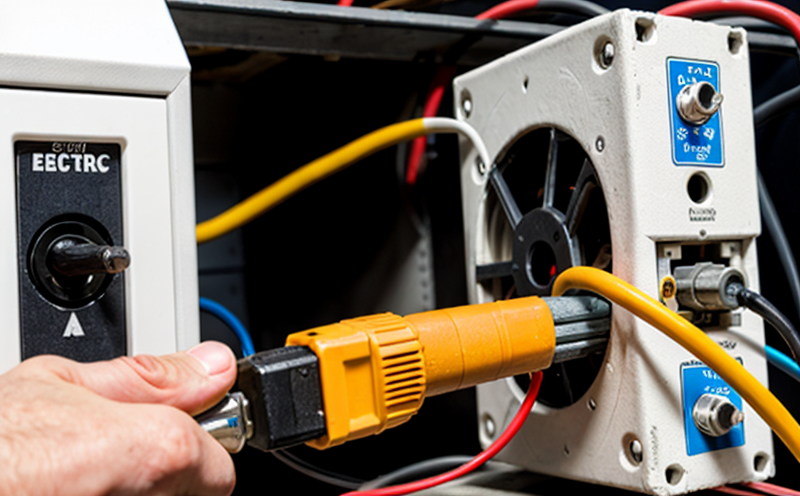EN 61000-4-13 Harmonics and Interharmonics Test
The EN 61000-4-13 standard is an essential part of the IEC (International Electrotechnical Commission) suite designed to ensure electrical safety and electromagnetic compatibility in power systems. This specific test focuses on harmonic distortion, interharmonic frequencies, and their impact on power quality within HVAC (Heating, Ventilation, and Air Conditioning) equipment.
Harmonics are multiples of the fundamental frequency, typically caused by nonlinear loads such as rectifiers, inverters, and variable speed drives. These can lead to increased energy consumption, overheating, and reduced system efficiency in HVAC systems. Interharmonics, on the other hand, involve frequencies that are not integer multiples of the fundamental frequency but still have a significant impact on power quality.
The test aims at verifying that the equipment complies with specific limits set by EN 61000-4-3 and EN 61000-4-7, which address harmonic and interharmonic distortion in supply networks. By ensuring compliance, this test ensures reliable operation of HVAC systems, minimizes energy losses, and prevents potential damage to sensitive equipment.
The testing process involves connecting the HVAC equipment under test to a power source with controlled harmonic content. The equipment is then subjected to a series of tests that include measuring voltage and current distortion levels at various points in the system. Instruments such as high-precision digital oscilloscopes, spectrum analyzers, and data loggers are used for accurate measurements.
During testing, it's crucial to ensure proper specimen preparation. This includes ensuring the equipment is fully assembled according to manufacturer specifications and that any required accessories or components are included in the test setup. Calibration of all measurement instruments is also critical to obtaining reliable results.
The test results are analyzed against the specified limits in EN 61000-4-3 and EN 61000-4-7, which define permissible levels of harmonic distortion at various points in the power distribution system. Compliance with these standards ensures that the equipment does not generate excessive harmonic content, thereby protecting both the equipment itself and other sensitive devices connected to the same power supply.
Regular testing is recommended for HVAC systems, especially those installed in environments where there are many nonlinear loads or where the quality of the power supply could be variable. This ensures ongoing compliance with regulatory requirements and helps maintain optimal performance of the system over its lifecycle.
In summary, the EN 61000-4-13 test is vital for ensuring that HVAC equipment operates efficiently and safely within electrical networks. By adhering to these standards, businesses can avoid costly downtime, reduce maintenance requirements, and contribute positively to environmental sustainability by minimizing energy waste.
Benefits
- Achieves Compliance with International Standards: Ensuring your equipment meets EN 61000-4-3 and EN 61000-4-7 standards helps avoid non-compliance issues that could lead to fines or product recalls.
- Enhanced Product Quality: By reducing harmonic distortion, you can improve the performance and longevity of your HVAC equipment. This leads to better efficiency and lower operational costs.
- Promotes Safety: Ensuring compliance with these standards helps protect against potential hazards associated with improper electrical signals in power systems.
- Sustains Environmental Impact: Minimizing energy waste and preventing overheating contribute to a more sustainable approach to energy use in HVAC systems.
Eurolab Advantages
At Eurolab, we pride ourselves on providing comprehensive testing services that go beyond basic compliance checks. Our team of experts ensures that each test is conducted rigorously and with the highest level of accuracy.
- State-of-the-Art Facilities: We have advanced laboratories equipped with the latest technology, ensuring precise measurements and reliable results.
- Experienced Technicians: Our team consists of highly skilled professionals who are trained to conduct these tests in accordance with international standards.
- Comprehensive Reporting: We provide detailed reports that not only state compliance but also offer insights into areas where improvements can be made.
- Customer Support: Our dedicated customer service team is always available to answer questions and assist with any concerns you may have during the testing process or afterward.
Environmental and Sustainability Contributions
By ensuring that HVAC equipment complies with EN 61000-4-3 and EN 61000-4-7, we contribute to environmental sustainability in several ways. Reducing harmonic distortion helps minimize energy losses, which is crucial for lowering the overall carbon footprint of industrial processes.
Our testing services also help businesses operate more efficiently by identifying potential issues early on, thus avoiding costly repairs and replacements. This leads to longer equipment lifespans and reduced waste generation, both critical factors in environmental sustainability efforts.
In addition, our compliance testing supports global initiatives aimed at improving power quality and reducing the impact of industrial operations on local grids. By ensuring that all equipment meets these standards, we play a role in maintaining reliable and efficient electrical networks, which is essential for sustainable development.





